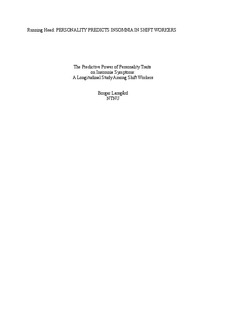| dc.description.abstract | Shift work can have adverse effects on employees' health, including symptoms of
insomnia. This may cause severe problems both for employee and employer. The personality variables morningness, neuroticism and extraversion, along with some demographic variables (e.g. gender, age) have been found to correlate with insomnia symptoms, but predictive data have been scarce. This study sought to discover whether personality variables could predict insomnia. A hierarchical longitudinal (six months) regression study was conducted (N=96). Respondents were shift workers employed in the health or social sector in Trondheim, Norway. Age, gender, children living at home and shift schedule were included in block 1, and neuroticism, extraversion and morningness in block 2. Insomnia, as measured by the Bergen Insomnia Scale, was set as the dependent variable. Neuroticism was positively predictive of insomnia at T2, in accordance with previous studies, while age and morningness were negatively related, opposing what have been found earlier. It thus seems that some personality variables can predict insomnia among shift workers; however, more longitudinal studies with larger samples should be conducted to validate the results. | nb_NO |
